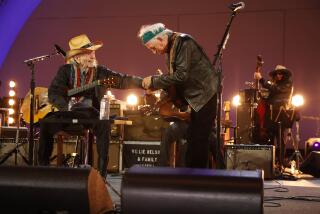Gavin Friday’s Wilde, Weill Life
- Share via
Artist: Gavin Friday and the Man Seezer.
Personnel: Gavin Friday, vocals; the Man Seezer, piano; Michael Blair, percussion; Fernando Saunders, bass; Sara Homer, saxophone.
History: Dubliner Friday (born Fionan Hanvey) got through his troubled teens on the inspiration of David Bowie, T. Rex, Roxy Music and Oscar Wilde. In 1977, he and some friends in the city’s Lypton Village art clique formed the Virgin Prunes, an uncompromising, flamboyant, iconoclastic, erratic band fondly remembered for wearing dresses and throwing raw meat at their audiences. They also released three albums on Rough Trade Records in their nine-year tenure. Post-Prunes, Friday opened a cabaret in Dublin called the Blue Jaysus and flexed his visual-arts and performance-art muscles, teaming in assorted endeavors with members of the Fall, Soft Cell and U2--the Edge’s brother was in the Prunes, and Bono is a very good friend of Friday. Friday teamed with classical pianist/cellist Maurice Roycroft, who goes by the name of the Man Seezer, and while visiting U2 in New York at Bono’s invitation, he landed a deal with Island Records. Island head Chris Blackwell paired the duo with producer Hal Willner, noted for his imaginative tribute anthologies to Mingus, Weill and Disney. The product of their collaboration is the recently released album “Each Man Kills the Thing He Loves.”
Sound: Brel via Bowie is Friday’s starting point these days, as his rough-textured voice strives for the hyper-emotional, theatrically styled mode of expression he absorbed listening to Piaf et al. He ranges from the delicately intimate to the flamboyantly theatrical, urgent whispers to cracked cries, and on “Rags to Riches” he creates a bizarre Tom Waits-Joel Grey hybrid. (Some of Waits’ musicians, including the tour’s Blair and Saunders, are in on the sessions). Friday’s old hero Oscar Wilde is also present, as writer of the title song’s verses. With his Weill-y touch, producer Willner finds a consistently haunting tone for these explorations of isolation and salvation--in the version of Dylan’s “Death Is Not the End,” he tests the tune’s folk-gospel optimism with a truly terrifying flood of orchestral darkness. Like the singer, the spirit prevails.
Show: Tuesday at Club Lingerie.
More to Read
The biggest entertainment stories
Get our big stories about Hollywood, film, television, music, arts, culture and more right in your inbox as soon as they publish.
You may occasionally receive promotional content from the Los Angeles Times.










